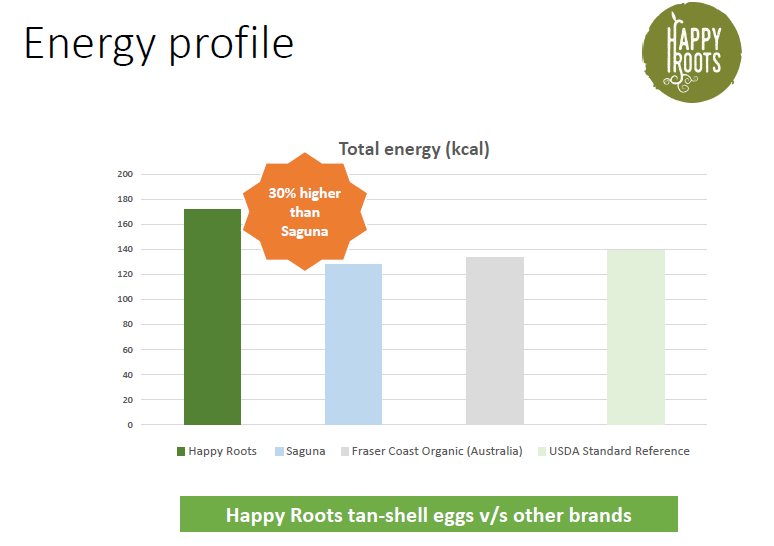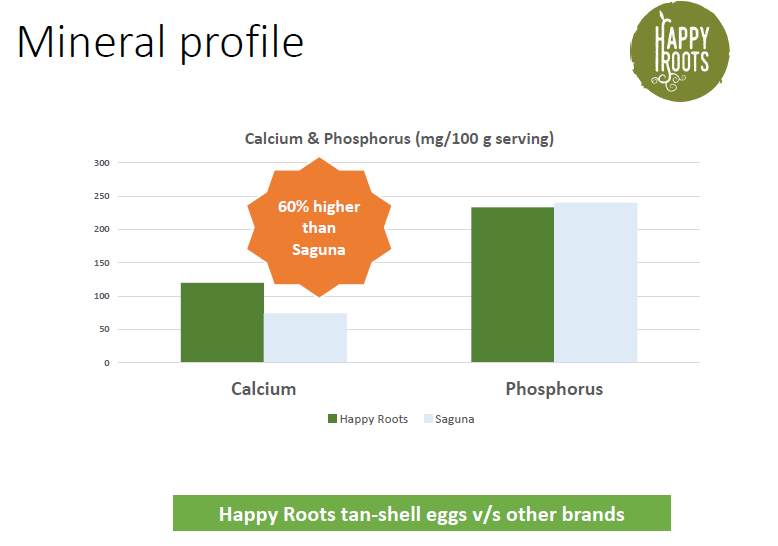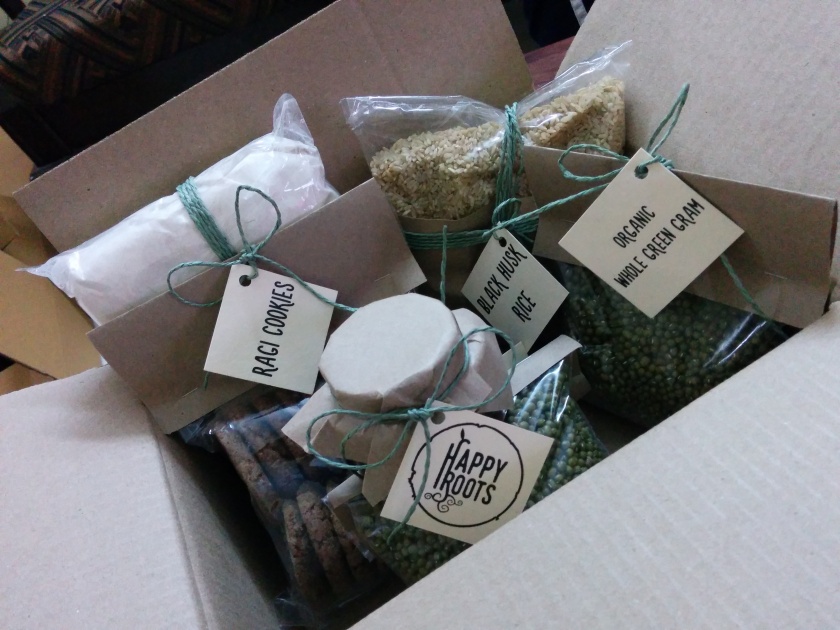In this post I have written a phase wise progress of Happy Roots. How I approached one problem at a time, what went wrong and how did I start afresh. Maybe I have made mistakes on the way but I learnt some biggest lessons in business. The best being “Be close to your consumer and she will guide you through”.
Phase-1: Market linkage for small poultry farmers in Vidarbha
Last year same time (April 2015) Happy Roots started as a project to build market linkages for small farmers in Vidarbha. Chetana foundation (our non-profit partner), the farmers and I worked really hard for 06 months to make this happen. It was a small project but had a good scope and we attracted attention from state government too. In September, 2015 we tested our organic, cage-free eggs with few restaurants in Pune. The product was a hit (we had some great nutritional analysis results for the eggs). Below are some snapshots of the nutritional profile of the eggs we sourced and marketed:


But soon we started facing some operational challenges. Shelf-life and quality issues, to be precise. The eggs weren’t rotten but they had a dark spot in the egg yolk. After a month’s of brainstorming with Chetana and Krishi Vigyaan Kendra (an R&D institute by the govt. meant to provide research support to farmers) we realized that the dark spot in yolk was inherent to a breed of birds we raised! Not in the most ambiguous of my dreams would have I imagined a problem situation like this. The eggs were good to eat as per KVK but our chefs had objection. I spent days meeting all the chefs who tested our product and understood why they wouldn’t use our product. I reached a dead end and put the project on hold.
Phase-2: More farmers got involved and testing a market for non-commercial grains & farmer products
While I was struggling with my next steps I constantly met chefs in Pune, kept talking to people around me (who I thought would be interested in buying a product sourced and made by farmers). I looked at Blue apron, Hello fresh, Farm box LA and many such other western startups connecting farms and consumers. In January, 2016 I tested a subscription box model (at a small level) with around 40 families in Pune. We conducted personal interviews with each of these families (roughly 60 individuals) and received some great insights, many of which were contrary to my beliefs.
- 80% of the people we interviewed said that would prefer products which are ready to eat. Cereals and snacks to be precise
- Almost everyone liked the non-commercial products (black husk rice, whole wheat flour from indigenous wheat, organic wild forest honey) in the box but the % was heavily skewed towards our Amaranth breakfast cereal & Ragi cookies. Reason – “CONVININECE” or ease of consumption

We digged more and finally zeroed on a food category that fit what consumers wanted and what we could address as a small business. And all this while we never diverted from our mission to build a business that generates sustainable incomes for farmers and involves them in sourcing, processing and packing.
Phase 3: Addressing the market of artisanal, wholesome health snacks
100 consumers
30 restaurants
12 months struggle
55 product iterations
later, we are now ready to launch our first health snack box which has already gone through smaller rounds of consumer tasting. Here is what we are offering:


A pack of wheat thins made from whole grains and natural whey liquid (extracted from cultured dairy) served with a sweet and savory dip. We will be introducing seasonal dips so that we use the freshest, seasonal, local ingredients. For summers we have Greek Tzatziki (fresh yogurt dip with dill & cucumber) and Malaysian sweet mango dip (delicious dip made from golden mangoes, fresh ginger & cinnamon).
The journey is now more uphill but we have a plan!
When I look back at what all we did to keep our business going, here are some key learning:
- Every time we approached an idea, right from the start till the end we closely worked with our target customers. We spent hours meeting them, listening to them, iterating and then coming back for more feedback. This process guided us through whenever we hit a blind alley
- All the product trials we did were paid. We are a bootstrapped startup and money has always been an issue. We put in a lot of hard work and research in our products (and always paid higher than market rates to our farmers) and hence we charged our users for our products. We were upfront about it and guess what, are lovely customers were more than happy to pay the price!!
- We kept the momentum. Of course there were days when I was hibernating and would roll back into my shell for weeks but in my head I was constantly looking for a solution and searching for next steps. It did look tough at that time but thankfully the momentum made us resilient and helped us sail through failure
The journey was tough, full of rejections, failures, heartaches but there have been so many people who came my way, helped me through each of the phases of my startup. Some of them stayed back and now are a part of our small team.
Happy Roots finally have a face online. Here is our website –Happy Roots.
You will get a macro view of what we are doing through our website. If you are a café, restaurant or bistro who focuses on health, organic and natural food products please write to us at reema@happyroots.in and I would be delighted to explore a sales partnership with you.
Thank you for reading my blog posts and being a part of my journey. I feel lucky and happy to read all the messages you share on Facebook, twitter and via emails. Please keep them coming (:
